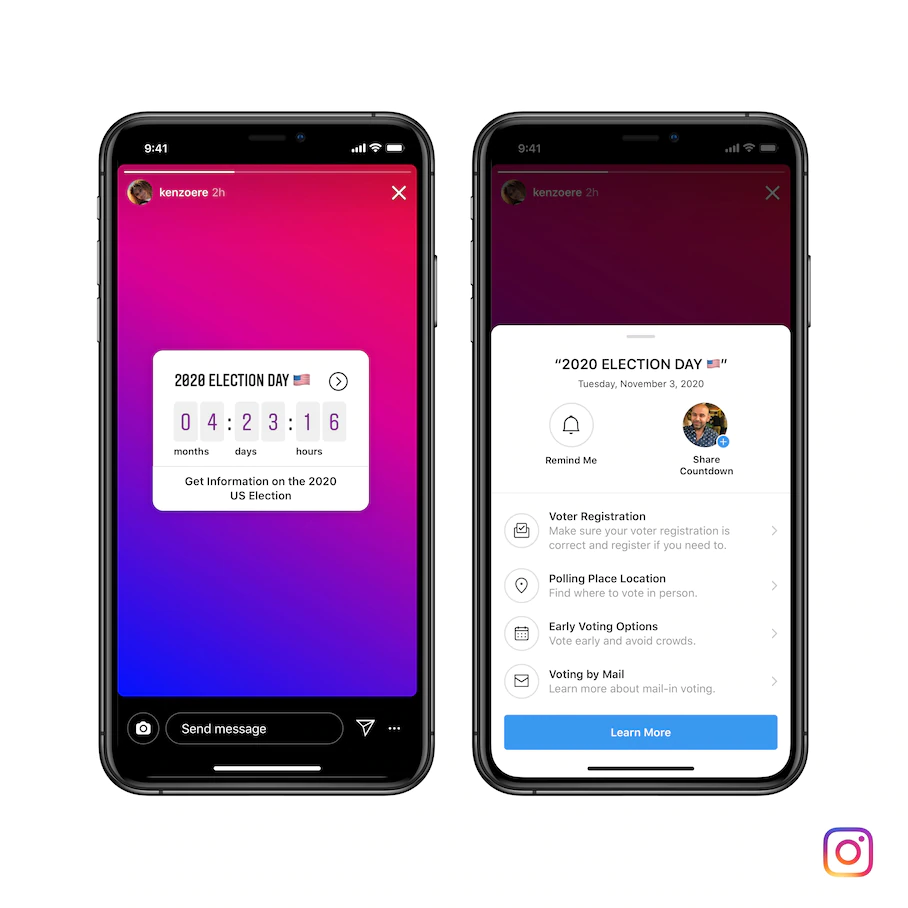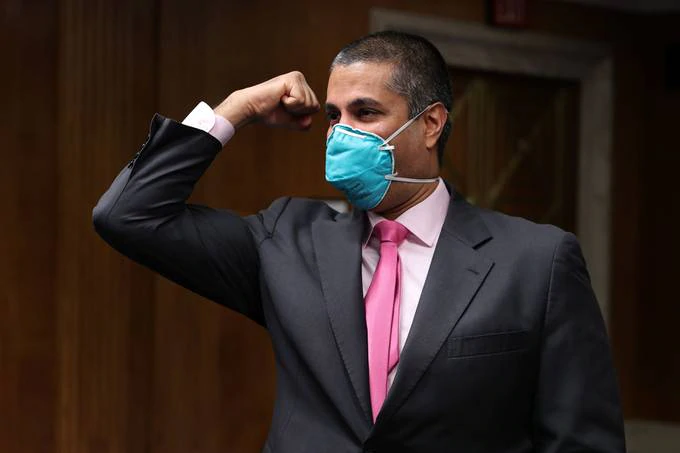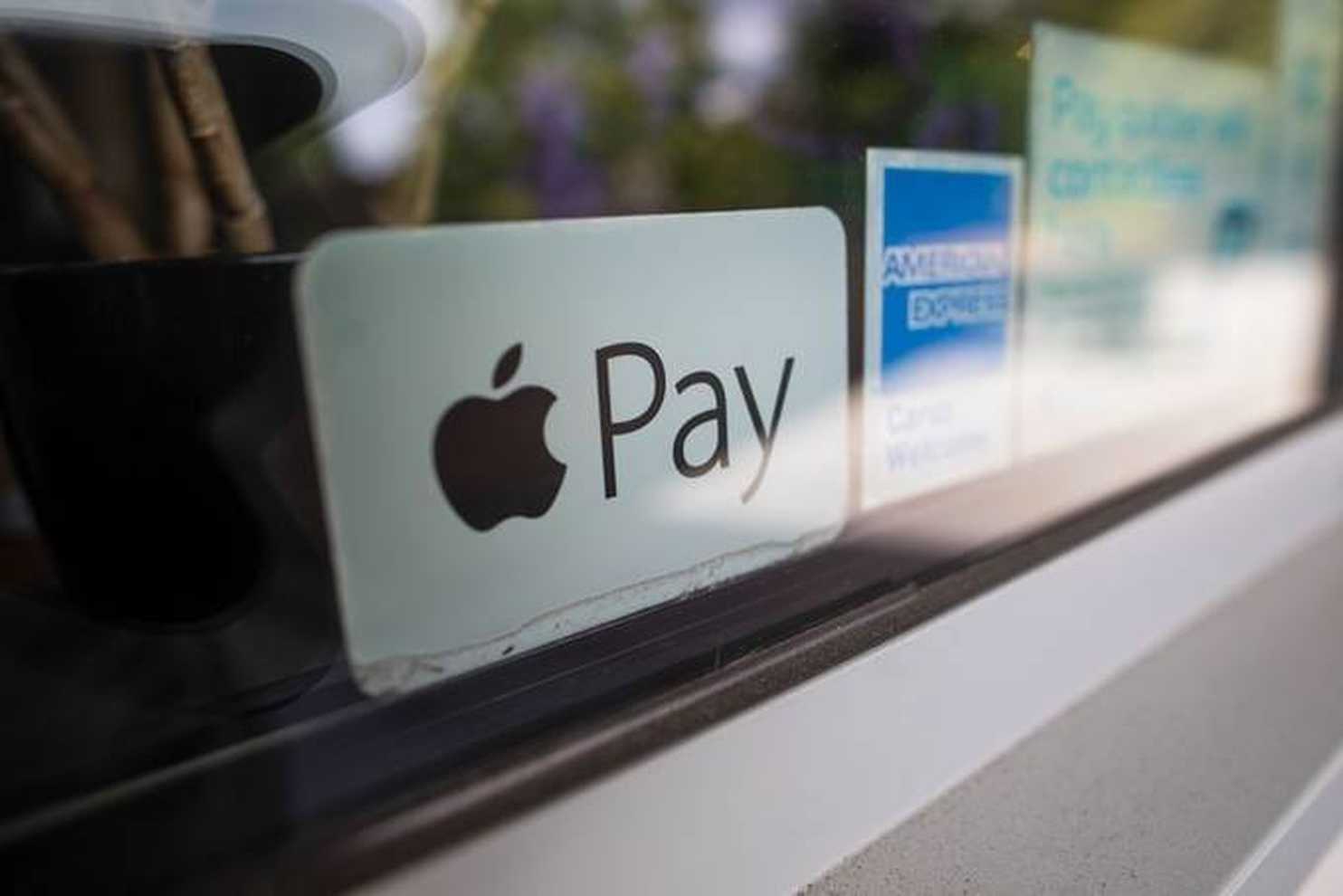with Tonya Riley
The coronavirus pandemic could boost Apple’s longtime ambitions to get consumers to use their phones, rather than their wallets, to pay at checkout counters. Unless antitrust regulators get in the way.
The iPhone-maker’s mobile payment system is being investigated in Europe as consumers and stores flock to contactless and cash-free solutions to avoid possible contagion from contaminated bills or credit card reader keypads.
The European Commission cited unexpectedly quick adoption of mobile payments in its announcement yesterday of dual probes into Apple’s power and potential anticompetitive behavior.
“This growth is accelerated by the coronavirus crisis, with increasing online payments and contactless payments in stores,” the commission’s vice president Margrethe Vestager said in a news release. “It is important that Apple’s measures do not deny consumers the benefits of new payment technologies, including better choice, quality, innovation and competitive prices.”
A sticker advertises Apple Pay as an accepted payment method at a restaurant Photographer: Chris Ratcliffe/Bloomberg
Mobile payment companies including PayPal have raised competition concerns about Apple Pay with regulators in the United States and Europe, according to a person familiar with matter, who spoke on the condition of anonymity because they weren’t authorized to speak to reporters.
The companies are concerned about Apple’s restrictions on the presentation of rival payment options on its iPhones. Consumers for instance can add PayPal to mobile payment systems on Android or Samsung phones – but not Apple Pay. Apple also restricts developers’ access to a chip that enables contactless payments, while Android phones, for instance, allow outside developers to access it.
In a news release, the European Commission said Apple dictates the terms to merchants who accept Apple Pay and limits the use of the wireless “NFC” chip on iPhones only to Apple’s own service.
Apple pushed back on the investigations in the European Union, saying that its products promote competition.
“It’s disappointing the European Commission is advancing baseless complaints from a handful of companies who simply want a free ride, and don’t want to play by the same rules as everyone else,” Apple said in a statement. “We don’t think that’s right — we want to maintain a level playing field where anyone with determination and a great idea can succeed.”
The company has in the past defended some of the practices that its rivals see as anticompetitive on the grounds of privacy, which is particularly sensitive in the field of online payments.
“And as we’ve grown together, we’ve continued to deliver innovative new services — like Apple Pay — that provide the very best customer experience while meeting industry-leading standards for privacy and security,” the company said.
Experts say that if regulators want to address the competition concerns, they need to act fast.
The pandemic could entrench Apple as a dominant player in contactless payments before startups and other payment rivals even have a chance to mount a serious challenge, said Tim Derdenger, who teaches at Carnegie Mellon University’s Tepper School of Business.
“For the small entrants, doing it now while consumers are making this adoption could allow for more fair competition,” Derdenger said. “Three months, six months, a year from now could be too late for a small entrant company. That’s probably what the E.U. is thinking.”
However, the investigation is likely to be a lengthy process, which could ultimately result in fines or other changes to Apple’s business if the bloc finds Apple behaved in an anti competitive manner.
Apple has said little publicly about how the pandemic has affected usage of Apple Pay. In the company’s earnings call that covered the second quarter of its 2020 fiscal year, Chief Financial Officer Luca Maestri said that grocers including Trader Joe’s and Woolworth’s were adopting the technology to serve customers safely, per a transcript. But analysts expect health concerns could accelerate the trend.
Antitrust scrutiny of Apple is heating up even beyond Apple Pay.
The European Commission is simultaneously probing the App Store. Rivals have blasted the company’s practice of collecting a portion of subscriptions and other purchases, as my colleagues Reed Albergotti and Tony Romm reported yesterday. Some of the most prominent mobile app companies are taking their complaints public about Apple’s grip on the iPhone.
The companies — Tinder parent Match Group and Fortnite owner Epic Games — each blasted Apple’s long-standing policy on App Store sales, saying it has cut their profits and left consumers paying higher prices.
Epic earns revenue from Fortnite players who are willing to pay real dollars for digital currency that can be redeemed for items in the game — and Apple takes a cut of those sales.
Epic Games chief executive Tim Sweeney told my colleagues security has nothing to do with Apple’s “extractive” fees. “The iOS App Store’s monopoly protects only Apple profit, not device security.”
“Apple is a partner, but also a dominant platform whose actions force the vast majority of consumers to pay more for third-party apps that Apple arbitrarily defines as “digital services,” Match Group said in a statement, adding Apple “squeezes industries like e-books, music and video streaming, cloud storage, gaming and online dating.”
“We’re acutely aware of their power over us,” the company added.
Meanwhile, Basecamp’s new Hey email service is taking its feud with Apple to Twitter, after the company rejected an update to its new app that fixed several bugs. Apple told the company it violated its policies by not using the Apple payments system. The developers didn’t think that rule applied because people can’t sign up or pay in iOS app. Now Basecamp chief technology officer David Heinemeier Hansson says the company risks being removed from the App Store, unless it gives Apple a cut of its sales:
Wow. I’m literally stunned. Apple just doubled down on their rejection of HEY’s ability to provide bug fixes and new features, unless we submit to their outrageous demand of 15-30% of our revenue. Even worse: We’re told that unless we comply, they’ll REMOVE THE APP.
— DHH (@dhh) June 16, 2020
Apple declined to comment, stating that it doesn’t comment on specific app approvals.
It remains to be seen if chief executive Tim Cook will appear in front of Congress.
Tech companies including Apple continue to be in the antitrust spotlight in Washington, as the House seeks to have chief executives from major tech companies testify as part of its year-long probe into the companies’ behavior.
Apple has not yet explicitly agreed to send Cook to testify, even as Google, Facebook and Amazon have said that their chief executives are open to it, under certain conditions, Tony reports. Apple has only committed to send a senior executive, which could escalate tensions between the smartphone maker and the committee.
Our top tabs
The Justice Department is set to propose a rollback of tech companies’ legal protections.

The U.S. Department of Justice building is bathed in morning light at sunrise. REUTERS/Mary F. Calvert/File Photo
The department’s proposed reforms, which could be announced as soon as today, are designed to pressure online platforms to be more aggressive in taking action against illicit and harmful conduct on their sites, and to be more consistent in their decisions to take remove objectionable content, the Wall Street Journal’s Brent Kendall and John D. McKinnon report.
Congress would need to adopt the DOJ’s legislative plan. It takes aim at Section 230, a decades-old legal provision that grants tech companies legal immunity for the photos, videos and other content that people share on their services.
DOJ’s proposal builds on an executive order from President Trump last month, which took aim at that same legal shield due to the president’s allegations that the companies are biased against conservatives. The Journal reports this proposal is broader, seeking to strip civil immunity afforded to tech firms in a range of other circumstances so that victims of federal crimes online can sue the tech companies.
“The department’s proposal, for instance, would remove legal protections when platforms facilitate or solicit third-party content or activity that violates federal criminal law, such as online scams and trafficking in illicit drugs,” the Journal reports. “The department also wouldn’t confer immunity to platforms in instances involving online child exploitation and sexual abuse, terrorism or cyberstalking.”
Sen. Josh Hawley (R-Mo.) this morning also unveiled new legislation that takes aim at Section 230, Margaret Harding McGill reports for Axios. Under Hawley’s proposal, companies would not receive immunity under Section 30 unless they revise their terms of service to include pledges to operate in good faith.
Republican Sens. Marco Rubio (Fla.), Mike Braun (Indiana) and Tom Cotton (Ark.) have co-sponsored the legislation.
Facebook will launch a new tool to make it easier for U.S. users to see fewer political ads.

Facebook founder Mark Zuckerberg. (Andrew Caballero-Reynolds/AFP/Getty Images)
Facebook is also launching a new Voting Information Center, which will provide users with information about registering to vote, requesting a mail-in ballot and a resource for local election alerts.
The center is a part of the company’s ongoing work to proactively work against voter suppression and election interference, chief executive Mark Zuckerberg wrote in a USA Today op-ed. The company hopes to register 4 million people to vote across its platforms, he said.
“Voting is voice. It’s the single most powerful expression of democracy, the best way to hold our leaders accountable, and how we address many of the issues our country is grappling with,” Zuckerberg wrote. “I believe Facebook has a responsibility not just to prevent voter suppression — which disproportionately targets people of color — but to actively support well-informed voter engagement, registration, and turnout. ”
He also defended the company’s decision to leave up controversial comments by Trump. “Everyone wants to see politicians held accountable for what they say — and I know many people want us to moderate and remove more of their content,” he wrote. “But accountability only works if we can see what those seeking our votes are saying, even if we viscerally dislike what they say. ”

An image showing Facebook’s new Voter Information Center. (courtesy of Facebook)
Civil rights advocates who have spent years pushing Facebook to address issues of voter suppression say the new measure doesn’t go far enough to address voting rights.
“Facebook, at our urging, is moving to register millions of voters and build a voter education hub, but without taking sufficient action against politicians and their operatives who engage in voter suppression and incite violence,” Vanita Gupta, president and chief executive of The Leadership Conference on Civil and Human Rights, said in a statement. “Without taking the comprehensive approach to protecting voting rights and fair elections that we’ve been demanding, this announcement is a half-measure.”
And Democrats continue to lambast the company’s handling of Trump’s comments. House Speaker Nancy Pelosi (D-Calif.) encouraged advertisers to discourage platforms from amplifying violent content and misinformation at a forum on coronavirus misinformation yesterday, the Hill reports. She wants them to withdraw their ads and also mount a public pressure campaign.
“Advertisers are in a position — they have power — to discourage platforms from amplifying dangerous and even life-threatening disinformation,” Pelosi said during a George Washington University forum focused on misinformation.
Black start-up founders say investors hold them to a different standard from white founders.

Will Hayes, chief executive officer of Lucidworks Inc., stands for a photograph in Olympic Valley, Calif. (Max Whittaker/Bloomberg News)
Some chief executives told Bloomberg News’s Priya Anand and Sarah McBride that investors assumed their white employees were running their companies. Interviews with 20 black chief executives reveal the ways the venture capital ecosystem perpetuates discrimination.
“We can’t come in the room wearing a hoodie, not using our words properly, not sitting up, not looking you in the eye. We’re not going to be taken seriously,” James Norman, founder of tech start-up Pilotly Inc., told Bloomberg.
One black woman told Bloomberg that a group of venture capitalists assumed one of her interns, a young white man, was the head of her company. Other founders recount numerous stories of being mistaken for black peers.
Part of the issue lies with the racial makeup of the industry: Only 3 percent of investment partners at VC firms are black. That self-perpetuation can make it difficult for black founders to break into a world based on preexisting relationships. And while family money is often a prerequisite to getting a start-up off the ground, many black founders lack those resources.
“A ‘friends and family round’ doesn’t exist for black founders,” Norman said. “You come from a different place.”
More users are turning to Instagram and WhatsApp as a source of news during the pandemic, a new study finds.

Logos from Linkedin, YouTube, Pinterest, Facebook, Instagram and Twitter. (Olivier DoulieryAFP/Getty Images)
Instagram is used for news twice as much as it was in 2018 and could overtake Twitter as a news source next year, the Reuters Digital News Report 2020 found. WhatsApp has also gained popularity as a media resource — with nearly a quarter of users in six countries turning to the other Facebook-owned app during a week in April.
But increased reliance on social media for news also raises concerns about ongoing efforts to prevent misinformation from spreading, Rachel Lerman reports.
That’s especially true for WhatsApp, where information is visible only to users in a specific group, and it’s more difficult to detect viral lies. “This is a particular worry because false information tends to be less visible and can be harder to counter in these private and encrypted networks,” the report’s authors wrote. Facebook, which owns both WhatsApp and Instagram, is facing ongoing criticism for its refusal to remove misleading posts by Trump.
The reliance on social media could also be troubling for traditional news sources, which younger users are increasingly less likely to use, the study found.
Agency scanner
Federal regulators will open an investigation into Monday’s T-Mobile outage.

FCC Chairman Ajit Pai. (Chip Somodevilla/Pool/Reuters)
The Federal Communications Commission has fined carriers — including T-Mobile — for past service failures, the Wall Street Journal notes. T-Mobile attributed the Monday network outage that affected customers across the United States to a technical issue. There is no indication that a cyberattack was involved in the outage, despite viral allegations of a denial of service attack.
Privacy monitor
The FBI failed to follow through on its promise to discontinue “Black identity” as a domestic terrorist designation, records show.

A “Black Lives Matter” sign is painted in orange on Fulton Street in Brooklyn on Monday. (John Minchillo/AP)
Media Justice and the American Civil Liberties Union say that a public information request to the agency shows that of 1 million pages of responsive documents, up to one-third involve active investigations of black people for “Black identity” activities. The documents indicate that the agency misled Congress when it testified last fall that the designation was no longer in use.
The groups are now suing the FBI for public records that would reveal more information about the investigations.
More than 100 civil rights groups also sent a letter to Congress today pressuring lawmakers to stem surveillance funding for the FBI in light of ongoing abuses against communities of color.
“Unlike pervasive white supremacist violence, “Black identity” violence does not exist and we must know more about the current use of this dated domestic terrorist designation, with its long history of government persecution of Black leaders,” said ReNika Moore, director of the ACLU’s Racial Justice Program. “We ask Congress to increase their pressure for FBI transparency and stem the flow of federal funding to deploy surveillance tools in communities, where they disproportionately monitor Black and Brown families.”
More privacy news:
The digital race to 2020
Russian operatives used more than 300 social media platforms to undermine perceived enemies of Putin over six years.

The Kremlin’s Spasskaya Tower. (Pavel Golovkin/AP)
They relied on fake news articles and documents, and social media burner accounts with small followings to spread misinformation, researchers at Graphika found, Ellen Nakashima and Craig Timberg report.
Targets of the wide-reaching campaign included Ukraine’s government, the World Anti-Doping Agency, Kremlin critic Alexei Navalny, French President Emmanuel Macron and former U.S. secretary of state and presidential nominee Hillary Clinton.
The operation was less effective than Russia’s Internet Research Agency efforts in 2016 to spread misinformation, or the distribution of stolen emails from the Clinton campaign, researchers say. But it managed to stay undetected far longer. The report underscores the scope and extent of Russian disinformation operations, which probably will persist as the 2020 election approaches.
“This shows that we are still uncovering blind spots in our understanding of Russian interference and have work ahead of us to make sure we’re properly prepared to defend the 2020 election,” said Camille François, Graphika chief innovation officer. “Who are these guys and what are they really trying to achieve: These are questions we’re not currently able to answer. That’s disconcerting.”
Workforce report
AT&T is cutting thousands of jobs in light of the coronavirus and T-Mobile’s acquisition of Sprint.

A T-Mobile store. (Justin Lane/EPA-EFE/Shutterstock)
The cuts will include managers, executives, technicians, clerical jobs and retail workers, Ina Fried at Axios reports. The company will close 250 retail stores for AT&T and its prepaid brand Cricket, affecting 1,300 retail jobs. T-Mobile will also cut some jobs but didn’t confirm how many. AT&T said the pandemic sped up store closures, which were already planned.
The Communications Workers of America, which represents some AT&T employees, slammed the company for the layoffs.
More broken promises from @ATT.
Despite big talk about stepping up to lead the recovery, the company announced another round of job cuts and store closures this week.
There’s plenty of work to be done – where are the jobs going?’ #1uhttps://t.co/iIo9XKNbex
— CWA (@CWAUnion) June 16, 2020
Rant and rave
Reps. Mark Pocan (D-Wis.) and Chuy Garcia (D-Ill.) also weighed in on the job cuts:
.@ATT said the pandemic gave them a head start on ‘cost-cutting’—aka 3,400 layoffs.
Was it cost-cutting to spend billions on stock buybacks & dividends?
Once again wealthy shareholders are put ahead of 3,400 employees across the country.https://t.co/cVpZdXhqSs
— Rep. Mark Pocan (@repmarkpocan) June 16, 2020
Very disappointed to see @ATT pursuing disastrous layoffs to pay shareholders at a time when our communities need good jobs and connectivity more than ever. Our workers deserve better. #1u https://t.co/sHNWgKiZaL
— Congressman Chuy García (@RepChuyGarcia) June 16, 2020
More workforce news:
Trending
Mentions
- Ford Foundation president Darren Walker will join Square’s board as a director, Bloomberg reports.
- Apple’s head of diversity and inclusion, Christie Smith, is leaving the company people familiar with the matter tell Bloomberg.
Daybook
- House Intelligence Committee will hold a virtual open hearing with Facebook, Google and Twitter on Foreign Influence and Election Security Thursday at noon.
- Carnegie’s Partnership for Countering Influence Operations and Twitter will host an event on influence operations on Twitter on July 9 at 1 p.m.
- The Energy and Commerce Committee will host a hearing on online disinformation on June 24. The hearing will cover disinformation related to covid-19 and the recent racial unrest.
Before you log off
Our newsletters will be off on Friday in honor of Juneteenth. Here’s a primer by Karen Attiah, Washington Post Global Opinions editor, about the significance of the holiday.
Juneteenth explained pic.twitter.com/FlfE8p8FM7
— Dave Jorgenson (@davejorgenson) June 16, 2020
















